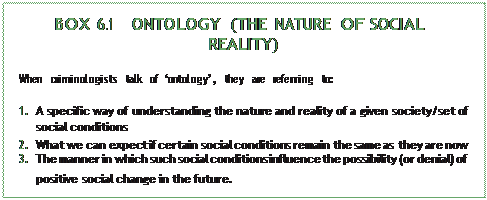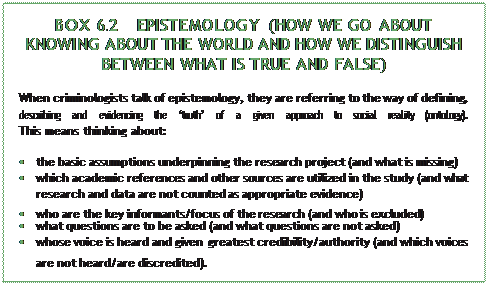 |
Ontology and epistemology
|
|
|
|
Different researchers have contrasting ideas about what prison is and how we should understand prison life. We can see in Table 6. 1 some of the differences between two contrasting perspectives on the prison place: penal reform and penal abolition.
 TaBle 6. 1 Differences between penal reform and penal abolitionism
TaBle 6. 1 Differences between penal reform and penal abolitionism
Penal reform – assumptions about the nature of prison reality (what prison is):
· Prison can be a humane and safe place
· Healthy prisons can be a conduit for positive change/rehabilitation
• Calls for change are primarily focused on the criminal process
• As valid justifications of the deprivation of liberty are assumed to exist, the legitimacy of the State’s power to punish is largely unquestioned
The way knowledge is generated (how we should understand prison life):
· Key sources include those from academics, policy makers, official reports and practitioners
· Key informants can include prisoners, policy makers and practitioners
•  Key questions are often functional and policy orientated in nature and aimed at finding answers about improving penal practices
Key questions are often functional and policy orientated in nature and aimed at finding answers about improving penal practices
Abolitionists – assumptions about the nature of prison reality (what prison is):
· Prisons are considered to be places of inherent harm, suffering and death
· The pains of imprisonment may be ameliorated but not removed
• People cannot be taught how to live freely whilst in captivity
• Penal change must correspond with social change (moves beyond criminal process)
• As prisons contradict basic human values, the legitimacy of the power to punish and the deprivation of liberty are questioned
The way knowledge is generated (how we should understand prison life):
· The view from below is emphasized and subjugated, (silenced) voices are given a platform to be heard and, if appropriate, the
Examples from this perspective:
Andrew Rutherford (1986) Prisons and the Process of Justice London: Heinemann
David Ramsbottom (2003) Prisongate
London: Free Press
John Podmore (2013) Out of Sight, Out of Mind London: Biteback
Alison Liebling (2003) Prisons and their Moral Performance Oxford: OUP
HMCIP (2016) HMCIP Annual Report
London: HMCIP
Vivien Stern (1984) Bricks of Shame
Harmondsworth: Penguin
Howard League for Penal Reform: http: //howardleague. org
Prison Reform Trust: www. prisonreformtrust. org. uk
Examples from this perspective:
Davis, A. Y. (2003) Abolition Democracy
New York: Seven Stories Press
Drake, D. (2010) Prisons, Punishment and the Pursuit of Justice London: Palgrave
Moore, L. and Scraton P. (2014) The Incarceration of Women London: Palgrave
Scott, D. (2018) Against Imprisonment
Winchester: Waterside Press
Scott, D. and Codd, H. (2010) Controversial Issues in Prison Buckingham: Open University Press
Scraton, P. and McCulloch, J. (eds) (2009) The Violence of Incarceration.
 London: Routledge
London: Routledge
(Continued)
TaBle 6. 1 (Continued)
|
|
|

position of the most excluded and disadvantaged people/group should be carefully (and selectively) adopted to ensure that this worldview is represented
• Key questions reflect the ethical and political priorities of human rights, democratic accountability and social justice
Sim, J. (1990) Medical Power in Prisons
Buckingham: Open University Press
Sim, J. (2009) Punishment and Prisons
London: Sage

The discussion in Table 6. 1 focuses on the ‘what’ and the ‘how’ questions of penal reform and abolitionism and how they impact on assumptions about penal realities and the legitimacy of knowledge generated by prison researchers. Such questions of legitimate knowledge are very important because they remind us that criminological research does not exist in a political or moral vacuum. When thinking about doing criminological research, it is essential that we first situate the (re)production of criminological knowledge within the everyday conflicts, moral dilemmas and power relations of the ‘real world’. Of course, this immediately begs questions regarding how, in the first instance, we should understand and generate knowledge about human life (Haiven and Khasnabish, 2014; Mills, 1959). In the academic literature, the ‘what’ and the ‘how’ questions of criminological research are framed around the interlinked philosophical conceptions of ontology (the nature of social reality) and epistemology (the nature of knowledge).
 |
Let us once again take the example of the prison to illustrate the three aspects of ontology (nature of social reality) highlighted in Box 6. 1. The ontology of a liberal penal researcher who is committed to penal reform is that while the prison is a
painful environment justified on the grounds of punishing offenders, it can also be a place that can generate positive human change. In other words, prisons can act as conduits for prisoner rehabilitation. Liberal penal researchers argue, however, that existing prison conditions often fail to meet the necessary requirements to achieve this goal, hence the need for prison reform. The prison’s potential to bring about positive transformations of the human soul is only possible if the prison in the future is a good, healthy, virtuous and moral institution (Liebling, 1992). The ontology of a researcher who thinks prisons should be abolished is very different. For the aboli- tionist prison researcher, the prison is an inherently harmful place characterized by suffering and death. Although there have been times when the prison has facilitated positive human transformations, such instances are the exceptions that prove the rule. Prisons are places primarily of dehabilitation rather than rehabilitation. Further, the prison cannot be successfully reformed in the future because it is a place of harm, misery and denigration shaped by institutionally structured violence. Institutionally structured violence refers to the systematic denials of human need and the generation of injury, harm and death by the daily workings of a given State institution. As pris- ons will always be inhumane and immoral institutions, abolitionist researchers argue that they should be closed down and life-affirming alternatives promoted in their place (Scott, 2016a, 2018).
|
|
|
The ontological assumptions about the nature of social reality inevitably impact
on ‘epistemology’ – that is, understandings of the nature of knowledge and how researchers attempt to distinguish between claims of what is true and what is false (i. e. legitimate knowledge).
 |
Epistemology (the nature of knowledge) is important because the kind of questions researchers ask, and to whom, can lead to very different forms of evidence/knowledge about the kind of society that we live in and thus reaffirm or question previous ontological assumptions. Different researchers have different ontologies and episte- mologies. Indeed, when reading prison research it can sometimes feel like two very different literatures exist. One would anticipate (correctly) that the sources approv- ingly cited, questions asked and focus of the research project of a liberal penal researcher are often very different to those of a researcher who thinks that prison should be abolished. A shorthand way of discovering a researcher’s ontology is to read their list of references in a given publication. Whilst this is not always the case (some sources cited may be selectively presented or only used to indicate that the author is aware of their contribution to the field), it can often reveal their basic assumptions about the world/nature of social reality.
What the above discussion indicates is that to fully understand the tensions regard- ing how social research is conceived, supported, produced and disseminated, we need to consider the politics and ethics of doing criminological research.
|
|
|


